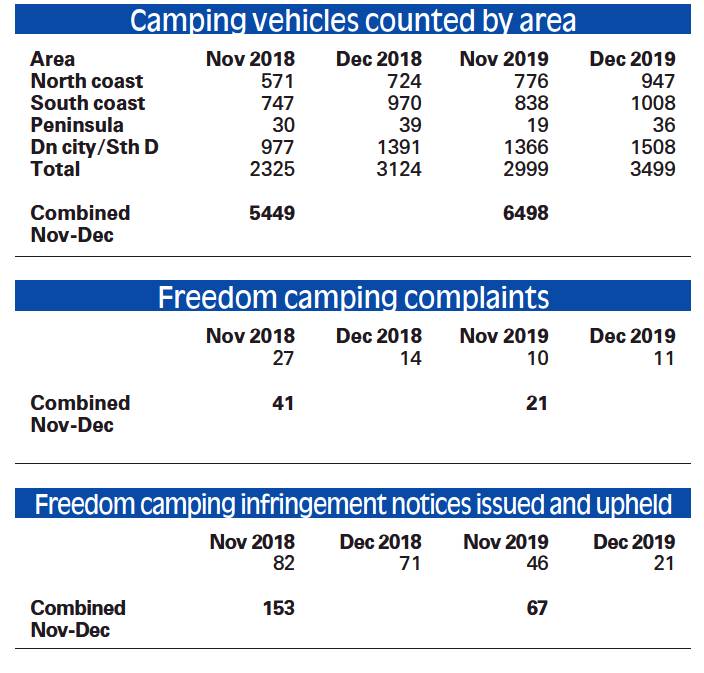Despite a 20% increase in the number of freedom campers around Dunedin so far this season, resident complaints and the number of infringement notices handed out have halved.
About 5450 camping vehicles were counted at freedom camping areas on Dunedin’s north coast, south coast, Otago Peninsula, city centre and South Dunedin during November-December 2018.
That number grew to 6498 in November-December last year.
By far, the greatest number of freedom campers were attracted to the city centre and South Dunedin, where more than 2870 vehicles parked up in NovemberDecember last year.
The north and south coasts of Dunedin were also popular spots in the same period last year, recording 1723 and 1846 vehicles, respectively.

Freedom camping complaints declined from 41 in November-December 2018, to 21 over the same period last year.
The number of freedom camping infringement notices issued and upheld also decreased, from 153 in 2018 to just 67 last year.
Under the existing camping control bylaw, certified selfcontained vehicles can stay for up to two nights on most gravelled or sealed Dunedin City Council land set aside for parking, including lay-bys.
Freedom campers in nonself-contained vehicles can only camp at designated sites.
Mr West said most of the infringement notices handed out so far this season were for camping in a restricted area without a valid selfcontainment certificate (36) and for failing to park in a designated area displayed on site (32).
Infringements were also issued for camping in a prohibited zone; failing to depart by the specified time; and camping on the same site for more than two consecutive nights.
Mr West believed freedom campers had been better behaved so far this season because the DCC had implemented several initiatives to improve compliance with the camping control bylaw.
‘‘These include increased education through our community ranger programme, increased provision of facilities (like toilets, rubbish bins etc), an increase in enforcement patrols/coverage and a further trial of the Thomas Burns car park as an unrestricted freedom camping site.
‘‘We have seen a decrease in infringements and complaints following the implementation of these initiatives.’’
The council would continue to monitor infringement rates throughout the camping season and adjust enforcement, community ranger patrols and the provision/maintenance of facilities if issues arose.
A review of the bylaw was being considered because freedom camping numbers were changing from season to season, and the council needed to make sure it was fit for purpose in the future, he said.
Results from a freedom camper survey carried out last season showed about $3.4 million was spent by freedom campers in Dunedin.
Given the increase in freedom campers visiting, it was hoped the amount spent would also increase.
‘‘We are continuing to survey campers this season and will be able to provide the results at a later date.’’
Comments
No idea why Freedom Camping is restricted to certified self contained campers only. Just what does DDC think it achieve?, it focus is solely on the facilities in the vehicle with zero education. While it can assist a camper be responsible they first have to decide to be responsible exactly the same as any other camper including those in non Certified Self Contained Vehicles. Like other councils they have been fed a line which they have swallowed hook, line & sinker. The Freedom Camping Act also covers a lot more people than just those in Motor-homers and Caravans (who are bit a minority) and includes anyone camping in a tent ie River rafters and kayaker's camping river side if with in 200 metres of a motor vehicle 'accessible area" - some goes for cycle tourists, Hunters and many many others which Council fail to include. NOTE the requirements are 'within 200 metres of a vehicle accessible area" - it does not even have to be a formed road. Public awareness of this needs to be increased substantially and Council stopped from limiting Camping to only certified Motor-homes & caravans. Responsible Campers Ass Inc, will be leading a campaign to increase awareness this coming year.
5 Meaning of freedom camp
(1)
In this Act, freedom camp means to camp (other than at a camping ground) within 200 m of a motor vehicle accessible area or the mean low-water springs line of any sea or harbour, or on or within 200 m of a formed road or a Great Walks Track, using 1 or more of the following:
(a)
a tent or other temporary structure:
(b)
a caravan:
(c)
a car, campervan, housetruck, or other motor vehicle.
(2)
In this Act, freedom camping does not include the following activities:
(a)
temporary and short-term parking of a motor vehicle:
(b)
recreational activities commonly known as day-trip excursions:
(c)
resting or sleeping at the roadside in a caravan or motor vehicle to avoid driver fatigue.
(3)
In subsection (1),—
camping ground means—
(a)
a camping ground that is the subject of a current certificate of registration under the Camping-Grounds Regulations 1985; and
(b)
any site at which a fee is payable for camping at the site
Great Walks Track means—
(a)
a track specified in Schedule 1; and
(b)
any other track specified by Order in Council made under section 44 as a Great Walks Track.












